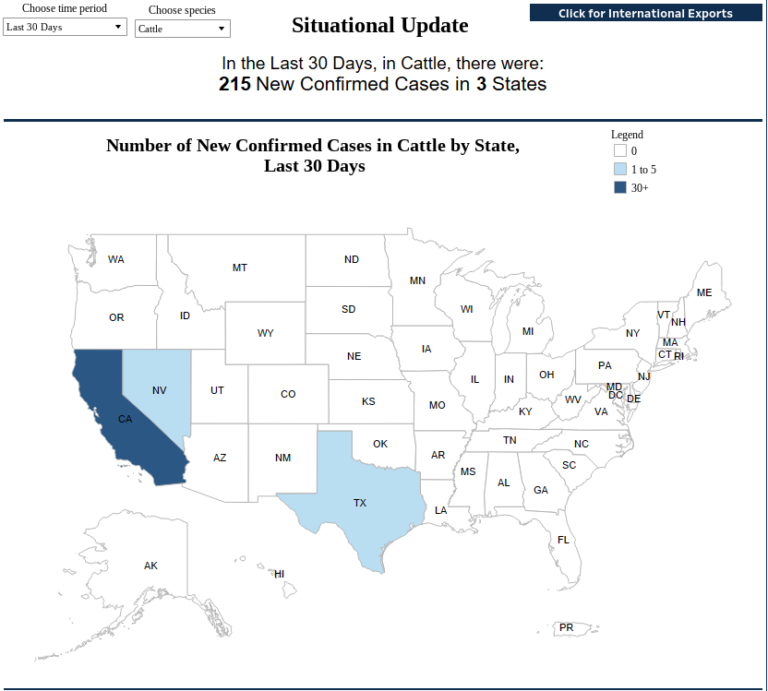By Ryan Hanrahan
NBC News’ Evan Bush reported this past weekend that “the simmering threat of bird flu may be inching closer to boiling over. This year has been marked by a series of concerning developments in the virus’ spread.”
“Since April, at least 65 people have tested positive for the virus — the first U.S. cases other than a single infection in 2022,” Bush reported. “Dairy cow herds in 16 states have been infected this year. The Centers for Disease Control and Prevention confirmed the country’s first severe bird flu infection on (last) Wednesday, a critically ill patient in Louisiana. And California Gov. Gavin Newsom declared a state of emergency last week in response to rampant outbreaks in cows and poultry.”
“‘The traffic light is changing from green to amber,’ said Dr. Peter Chin-Hong, a professor of medicine at the University of California, San Francisco, who studies infectious diseases,” according to Bush’s reporting. “‘So many signs are going in the wrong direction.'”

“No bird flu transmission between humans has been documented, and the CDC maintains that the immediate risk to public health is low. But scientists are increasingly worried, based on four key signals,” Bush reported. “For one, the bird flu virus — known as H5N1 — has spread uncontrolled in animals, including cows frequently in contact with people. Additionally, detections in wastewater show the virus is leaving a wide-ranging imprint, and not just in farm animals.”
“Then there are several cases in humans where no source of infection has been identified, as well as research about the pathogen’s evolution, which has shown that the virus is evolving to better fit human receptors and that it will take fewer mutations to spread among people,” Bush reported. “Together, experts say, these indicators suggest the virus has taken steps toward becoming the next pandemic.”
Experts Losing Faith in Government Response
KFF Health News’ Amy Maxmen reported that “experts say they have lost faith in the government’s ability to contain the outbreak.”
“Case in point: The U.S. Department of Agriculture this month announced a federal order to test milk nationwide. Researchers welcomed the news but said it should have happened months ago — before the virus was so entrenched,” Maxmen reported. “‘It’s disheartening to see so many of the same failures that emerged during the covid-19 crisis reemerge,’ said Tom Bollyky, director of the Global Health Program at the Council on Foreign Relations.”
Maxmen reported that “after the USDA announced the dairy outbreak on March 25, control shifted from farmers, veterinarians, and local officials to state and federal agencies. Collaboration disintegrated almost immediately.”
“Farmers worried the government might block their milk sales or even demand sick cows be killed, as poultry are, said Kay Russo, a livestock veterinarian in Fort Collins, Colorado,” Maxmen reported. “Instead, Russo and other veterinarians said, they were dismayed by inaction. The USDA didn’t respond to their urgent requests to support studies on dairy farms — and for money and confidentiality policies to protect farmers from financial loss if they agreed to test animals.”
“A sluggish response to emerging outbreaks may simply be a new, unfortunate norm for America, said Bollyky, at the Council on Foreign Relations,” Maxmen reported. “If so, the nation has gotten lucky that the bird flu still can’t spread easily between people. Controlling the virus will be much harder and costlier than it would have been when the outbreak was small. But it’s possible.”
Virus Even Affecting Pets
NBC News’ Doha Madani reported Wednesday that “a voluntary recall was issued for a line of raw and frozen pet food after a cat died of bird flu, a case that Oregon officials connected to the feline’s contaminated food.”
“Northwest Naturals told consumers Tuesday to toss their Feline Turkey Recipe raw frozen pet food if its sell-by date falls between May 21, 2026, and June 23, 2026. The company’s website said the batch, which was sold across the United States, tested positive for highly pathogenic avian influenza (HPAI), more commonly known as bird flu,” Madani reported.
Source : illinois.edu